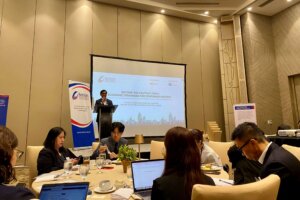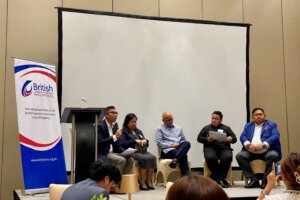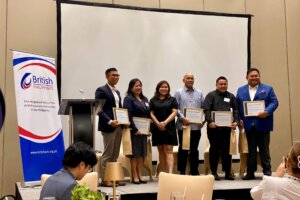The British Chamber of Commerce Philippines (BCCP) held its annual Mid-Year Briefing 2024, titled “Beyond the Halfway Point: Economic Strategies for Continued Success,” at Bonifacio Global City (BGC), Taguig, on July 23, 2024. Prominent leaders from the government and private sector discussed the Philippines’ economic strategies and achievements under President Ferdinand Marcos Jr.’s administration.

The esteemed panel featured Joseph Capuno, Undersecretary for Investment Programming at the National Economic and Development Authority; Ma. Cynthia Hernandez, Undersecretary and Executive Director at the Public-Private Partnership Center of the Philippines; Neil Adrian S. Cabiles, Assistant Secretary at the Department of Finance; Rupert Paul C. Manhit, Chief Operating Officer at Stratbase Group; and was moderated by Aaron Escartin from SGV & Co.
Under President Marcos Jr., the administration has embarked on ambitious infrastructure and digitalization projects designed to accelerate economic growth and enhance nationwide connectivity. Emphasizing sustainability, efficiency, and business-friendly policies, these initiatives aim to reduce traffic congestion, improve travel efficiency, and foster development across the country. The administration’s focus is on establishing a more integrated and efficient infrastructure network to harness the potential of the country’s youthful population for driving economic and social progress.
Assistant Secretary Cabiles presented a comprehensive overview of the government’s economic plans and policy developments, highlighting the administration’s efforts on infrastructure development through the Build, Better More Program and public-private partnerships. He highlighted the government’s strong commitment to enhancing collaboration with the private sector to address the country’s infrastructure deficiencies, citing the ongoing PPP at Ninoy Aquino International Airport (NAIA) as a prime example. Cabiles emphasized the importance of robust infrastructure for a thriving economy and detailed various policy enhancements to support business growth while reducing bureaucratic obstacles.

Asec. Cabiles also discussed the government’s initiatives to boost digitalization and modernize the economy. He emphasized that the digital economy is a key driver of the nation’s growth, contributing 8.4% to the GDP and generating a value of 2.05 trillion pesos. Among these initiatives is the launch of the National Artificial Intelligence Strategy Roadmap 2.0, which aims to prepare the country’s future workforce for an AI-driven future.
Rupert Paul C. Manhit addressed key reforms designed to position the Philippines as a prime investment destination in the region. He noted several key reforms, policy initiatives, and projects that have been enacted or implemented to create a more enabling environment for investments. He discussed amendments to the Retail Trade Liberalization Act, the Public-Private Partnership Code, and the Public Service Act, all of which contribute to the country’s goal of becoming a regional hub for smart and sustainable manufacturing and services, leveraging its strategic location in the Asia-Pacific region.
During the panel discussion, Undersecretary Capuno addressed economic challenges such as the country’s growing inflation and rising food insecurity, highlighting opportunities to boost investments in the agriculture sector as the government aims to mitigate these issues. He cited Executive Order No. 62, which extends lowered tariffs for agricultural commodities like rice until 2028, as a significant step toward increasing productivity and competitiveness.
Undersecretary Hernandez highlighted the importance of infrastructure development through public-private partnerships, noting an uptick of 53 unsolicited proposals in the first half of the year. She announced that nine new PPP projects were recently added to the pipeline, bringing the total value of the PPP list to PHP65 billion as of July 2024. Hernandez highlighted the PPP Center’s responsibility in facilitating efficient approval procedures, harmonizing legal frameworks, and providing clearer regulations and timelines as outlined in the PPP Code.

As the Philippines continues its journey towards economic prosperity, the British Chamber of Commerce Philippines remains committed to working closely with the government and the private sector. The BCCP supports various initiatives and programs aimed at further increasing the country’s potential as a prime investment destination for British companies and overall foreign investors.
The BCCP Mid-Year Briefing 2024 demonstrated the ongoing collaboration between government and private sector stakeholders in pursuing sustainable economic growth and development, ensuring that the Philippines remains an attractive and competitive destination for investment, marked by innovation and inclusivity.
Enhance Your Business Strategy
To support your organization in navigating the evolving economic landscape of the Philippines, consider partnering with John Clements Consultants, Inc., a leader in providing innovative talent management solutions. Our services can help you capitalize on the latest economic strategies and drive your business forward. Contact us today to learn more about how we can assist you in achieving your goals.





